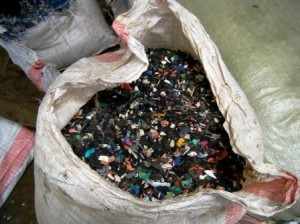As we strive to find solutions to issues such as an overabundance of waste and a shortage of lucrative job opportunities, promising recycling ventures in Tanzania are springing up that are providing work for some hard up citizens in the process. Households and businesses alike can incorporate more socially and environmentally responsible practices into their day-to-day activities by sorting their trash into these categories before it reaches the landfill: glass, plastic, metal, and trash.
This effort coincides with Responsible Tourism Tanzania’s waste management objectives by ensuring that some of your business’s rubbish actually gets into the recycling chain. And as it turns out, sorting your trash also benefits people at the Arusha City Dump who are turning your recyclables into a source of income by collecting glass, metal, and plastic to sell to nearby companies. To make their difficult jobs easier we’re urging businesses to begin separating their recyclable rubbish from the non-recyclable.
Read their stories to find out more about how this simple and responsible waste management strategy can help them make ends meet…
The Stories:

A truck bringing a load of garbage along with much-coveted glass and plastic bottles, tin cans, and scrap metal to the Arusha City Dump.
Everyday, trucks arrive with new loads of garbage as well as highly anticipated materials. Every load is a mixed bag, but there is sure to be something of value buried within. Amid the mountains of discarded items, scavenging dogs, and Marabou storks at the dump, one can also find people sifting through the refuse, in search of a few key items that might allow them to buy food for their families that day.
Meet Patrice Yugani. Originally from the Kilimanjaro region, now living in the Sokon 1 sub-village, this young Tanzanian has been scouring the nearby city dump for plastic water bottles, scrap metal, tins, and glass for six years now. Although he has no children, he uses the money that he makes from selling those items to take care of the rest of his family and pay school fees. According to Patrice, the dump provides employment for the jobless, ultimately making mere survival a possibility for them. He (along with everyone else we talked to) only wishes he had protective clothing such as gloves and glasses to help him do this work.
Vicky Elias, who lives in Moret with her five children, has similarly depended on this place for income for six years. Not only are the costs of feeding, clothing, and sending her children to school her responsibility, the burden of supporting her parents also weighs heavily on her shoulders. She says working at the dump “inasaidia kuleta mahitaji.” In other words, it helps her acquire the basic necessities to live. Vicky believes that her unfortunate circumstances force her to make a living this way, and although her faith has pulled her through thus far, she hopes for better conditions at the dump in the future, and would be grateful for anything that could mitigate her struggle.
Originally from Arusha, now living in Engosengui, Patrick Laurent has spent 10 years rummaging through the debris to support his family. He sells the various items he collects to companies like Maendelo Plastic, who in turn sells compressed and fragmented plastics to other enterprises such as A to Z Textile Mills Ltd. Patrick advises people that separating glass, metal, and plastic before the trash arrives at the dump could make life easier for everyone. He also admits to feeling disenfranchised by the government, and pleads with them to stop “kutowa dharau watu;” essentially, asking the government to acknowledge people who make a living there and their plight.
Their working conditions are far from ideal, and although they contend with dangers in the form of sharp edges, chemicals, and disease, they hardly complain. Perhaps the government can meet their small requests for protective clothing and overall recognition, but what can the average person do to help? They say it takes 21 days to form a habit, so here are some steps we can take to begin developing a good one.
Laying the foundation for foundation: make a habit out of sorting
STEP 1: Depending on the size of your business, designate receptacles for:
Note: Operations generating a significant amount of recyclables must have separate containers for Glass, Metal, and Plastic. Smaller businesses can just have separate receptacles for RECYCLABLE AND NON-RECYCLABLE. Future recycling initiatives will also include Paper and Compost.
STEP 2: Dispose of rubbish accordingly.
STEP 3: Package your glass, metal, and plastic into sulfate or bin bags.
STEP 4: Bring your separated and packaged recyclables to the dump (located at the front of the village surrounding the Sisters of Notre Dame Convent in Njiro).
Download this sign for your operations, Download Trash seperation sign copy2
Developing this easy habit now will lay the foundation for more recycling ventures in the future.
Supply and demand
Because Shanga is one of the few known glass recycling operations in Arusha, it tends to be in a constant state of wine bottle overload. The people who are making a living at the Arusha City Dump provide another option for recycling not only your glass, but your metals and plastics too. The supply of this valuable rubbish is more than adequate, but evidently so is the demand for it.
In conclusion
Resolving the fundamental problems of poverty and a surplus of garbage is a long way off; however, the toil of people like Patrice, Vicky, and Patrick are giving new life to materials that were once deemed waste. It’s not an easy life, but it’s the lives they are forced to lead, and if there’s anything fellow citizens and businesses can do on a daily basis to make their work easier, then why not? Sorting your trash is indeed a responsible and worthy endeavor.
OTHER INFO:
Upcoming film showing at Alliance Franco Tanzanienne of Arusha:
05 OCTOBER 7 PM
“Garbage Dreams” — The story of three teenagers born into the trash trade in the world’s largest garbage village, on the outskirts of Cairo. The winner of the Al Gore Reel Current Award and Oscar-shortlisted documentary.
USA & Egypt / 2009 / 79 min
It’s estimated that a tin could take about 50 years to decompose in a landfill, a glass bottle 1 million years, and plastic bottles may never fully decompose. Source: How Long Does Litter Last.pdf (U.S. National Park Service) (in RTTZ Dropbox)
Hyperlinks:
Shanga: http://www.shanga.org
Maendeleo: http://www.made-in-china.com/traderoom/sokoni
A to Z Textile Mills Ltd.: http://www.olyset.net/resourcecenter/news/020808/, http://www.acumenfund.org/investment/a-to-z-textile-mills.html
Tanzania Waste Directory (on Honeyguide website and in RTTZ Dropbox) click here to download>
A story written by about the neighborhood where the dump is located: Story.pdf (in RTTZ Dropbox)










